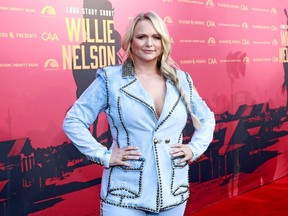
Reviews and recommendations are unbiased and products are independently selected. Postmedia may earn an affiliate commission from purchases made through links on this page.
Article content
LOS ANGELES — Stevie Wonder, Miranda Lambert, Billie Eilish, Nicki Minaj, Peter Frampton, Katy Perry, Smokey Robinson and J Balvin are just some of the over 200 names featured on a new open letter submitted by the Artist Rights Alliance non-profit, calling on artificial intelligence tech companies, developers, platforms, digital music services and platforms to stop using AI “to infringe upon and devalue the rights of human artists,” according to the letter.
Advertisement 2
Article content
The Artist Rights Alliance is an artist-led non-profit organization that advocates for musicians in a precarious digital economy.
Article content
The letter, while acknowledging the creative possibilities of new AI technology, addresses some of its threats to human artistry. Those include using preexisting work to train AI models — without permissions — in an attempt to replace artists and therefore “substantially dilute the royalty pools that are paid out to artists.”
Article content
“This assault on human creativity must be stopped,” the letter reads. “We must protect against the predatory use of AI to steal professional artists’ voices and likenesses, violate creators’ rights, and destroy the music ecosystem.”
The full letter is available here.
Advertisement 3
Article content
Last month, Tennessee became the first state to pass legislation designed to protect songwriters, performers and other music industry professionals against the potential dangers of artificial intelligence. Supporters say the goal is to ensure that generative AI tools cannot replicate an artist’s voice without their consent.
The bill — dubbed the Ensuring Likeness, Voice, and Image Security Act or “ELVIS Act” — goes into effect July 1.
“We employ more people in Tennessee in the music industry than any other state,” Tennessee Gov. Bill Lee told reporters shortly after signing the bill into law. “Artists have intellectual property. They have gifts. They have a uniqueness that is theirs and theirs alone, certainly not artificial intelligence.”
Article content






